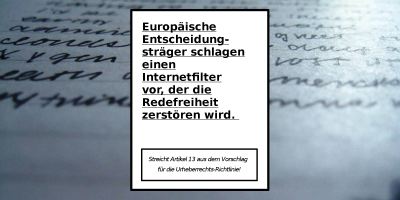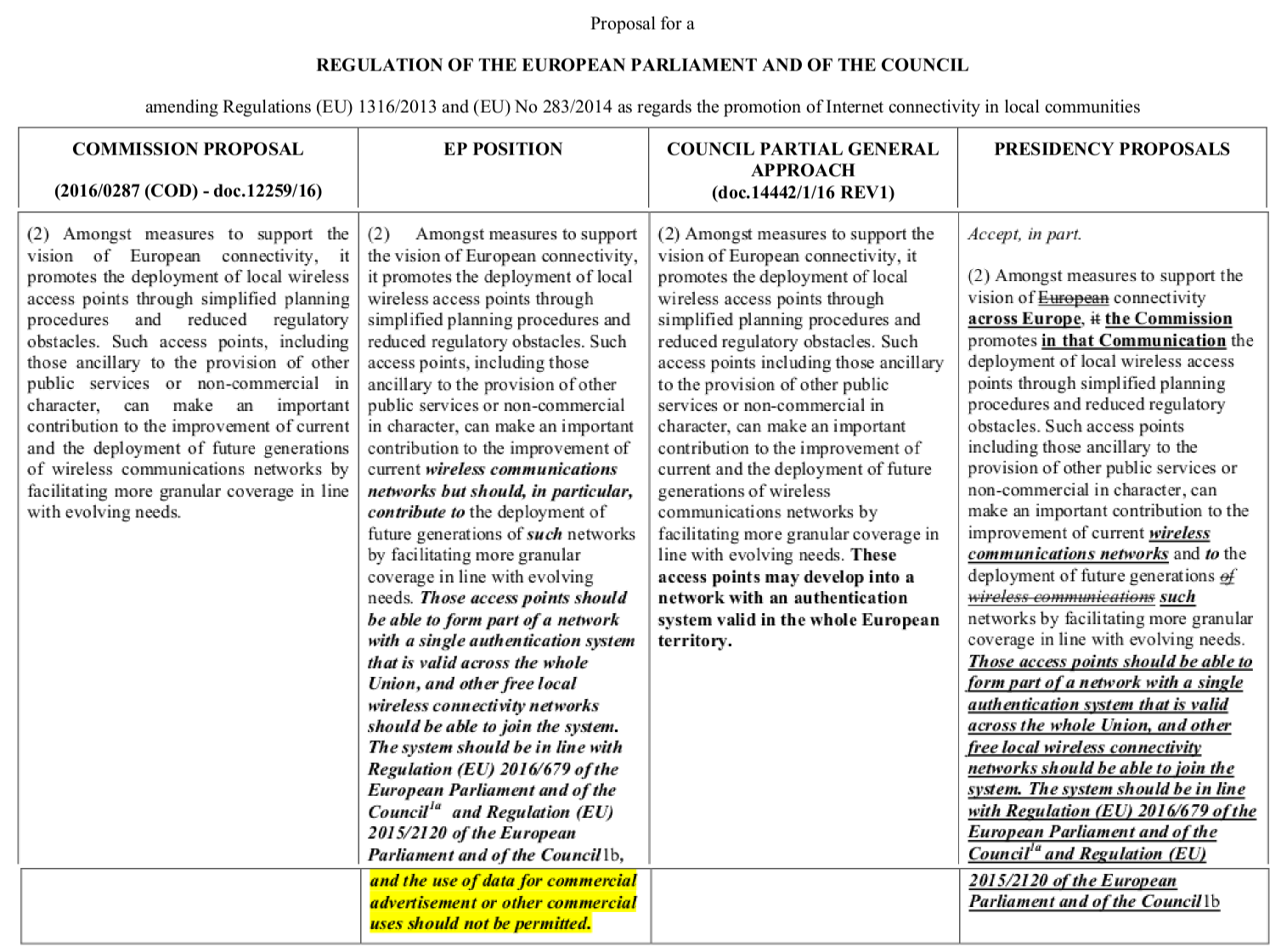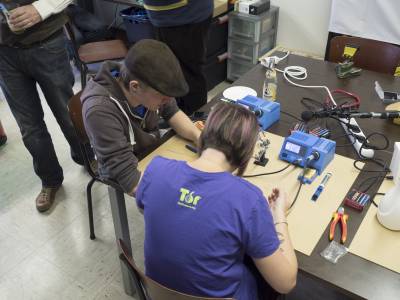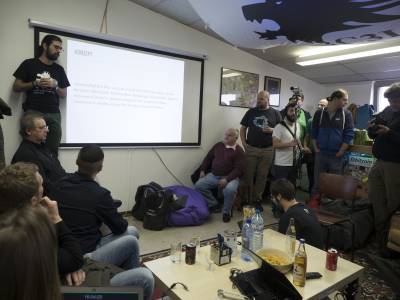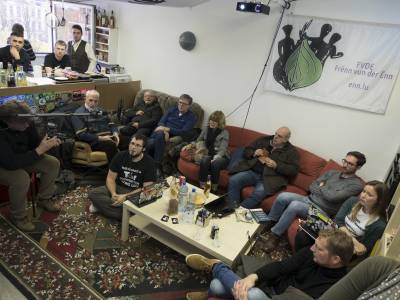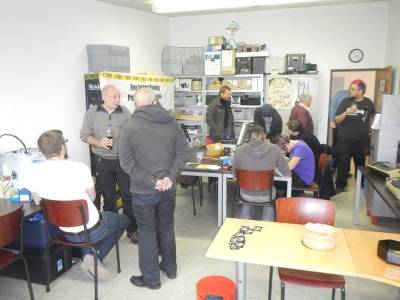News
#SaveYourInternet
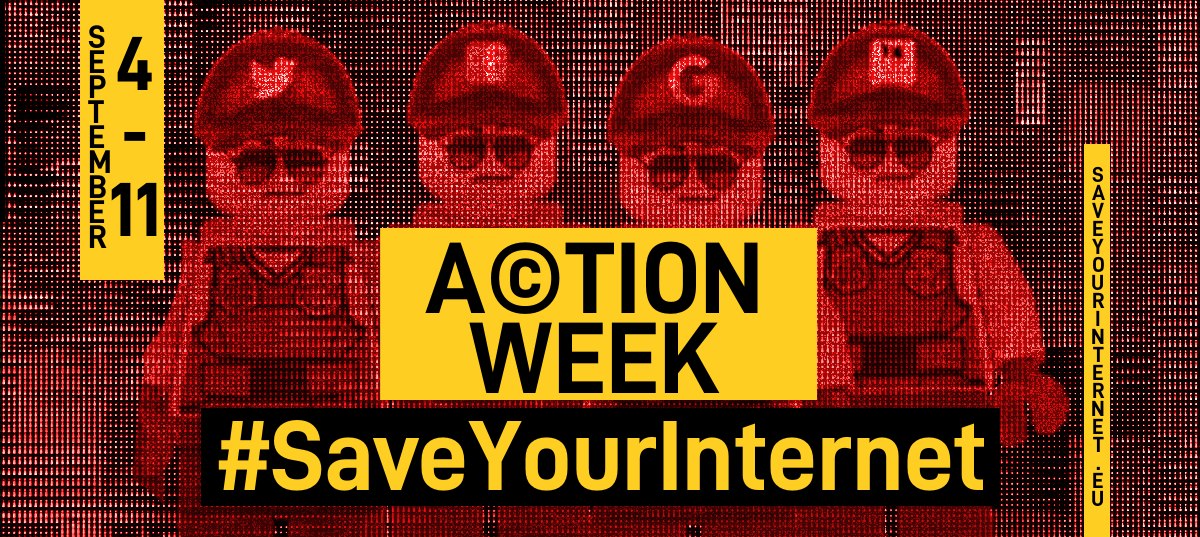
Article 13 is bad for the Internet as a whole: Over 70 Internet pioneers and experts have rallied behind Sir Tim Berners-Lee to address an open letter, on 12 June 2018, to the European Parliament wherein they urge MEPs to vote for the deletion of Article 13 for the sake of the Internet’s future, as it “would mandate Internet platforms to embed an automated infrastructure for monitoring and censorship deep into their networks”.
Article 13 is bad for EU citizens’ fundamental rights: Over 50 NGOs representing human rights and media freedom addressed an open letter, on 16 October 2017, to the European Parliament asking MEPs to delete Article 13, as it “would violate the freedom of expression set out in (…) the Charter of Fundamental Rights” and “provoke such legal uncertainty that online services will have no other option than to monitor, filter and block EU citizens’ communications”.
Article 13 threatens legal certainty in the EU: Academics from 25 leading Intellectual Property research centres in Europe have published Statement of 29 June 2018 entitled 'The copyright Directive: Misinformation and Independent Enquiry'. This follows an open letter of 26 April 2018, pointing out that there is scientific consensus on the fact that Article 13 “threaten[s] the user participation benefits of the e-Commerce Directive (2000/31/EC)”.
Article 13 will be bad for the European economy: European innovative media publishers have expressed their concerns around Article 13, who consider that “these rules are bad news for publishers who rely on an open and competitive internet to source, create and disseminate stories to their readers”. Allied for Startups, an organisation representing start-ups in Europe, explains that “the suggested filtering technology will raise the cost of launching a startup in Europe and drive talent away”.
The Parliament must promote a balanced and evidence-based approach to copyright enforcement and not fall into the trap of so-called ‘easy fixes’ to the detriment of our fundamental rights.
<html><center><iframe width="560" height="315" src="https://www.youtube-nocookie.com/embed/89ZkydX0FPw?rel=0" frameborder="0" allow="autoplay; encrypted-media" allowfullscreen></iframe></center></html>
#Chamberleaks - Chamber verseet bei der Sécherung vun hiren eegenen Donnée
De 07ten Mäerz huet den 100komma7 dorop opmierksam gemaach, dass den Internetsite vun der Chamber een Sécherheetslach hätt. Duercht einfach editéiere vun de Weblinken, konnt een esou ob Dokumenter zougräifen, déi net fir d'Ëffentlechkeet geduecht waren. De Chaos Computer Club Lëtzebuerg ass entsat iwwert d‘Einfachheet, wéi een un déi Donnée konnt kommen an och doriwwer, wéi d‘Chamber mat dësem Fait ëmgeet.
„Einfacht editéiere vu Weblinken ass keen Hackerugrëff. All Persoun, déi um Computer kann tippen, war dozou fäeg, un déi Donnée ze kommen!“ betount den Dennis Fink, Spriecher vum Chaos Computer Club Lëtzebuerg. Dëst erënnert un den „Tango-Hack“ vun 2010, wou een och einfach duerch d‘ännere vu Weblinks un Donnéeë vun Tango-Clientë konnt kommen.
Den Haaptproblem läit net doranner, dass et dat Sécherheetslach iwwerhaapt gëtt. De Problem läit doranner, dass déi Donnée iwwerhaapt ob engem ëffentleche Server léien. D‘Chamber muss hier Sécherheetsmesuren iwwerpréiwen a ganz kloer Richtlinnen opstellen, wat fir eng Dokumenter dierfen um ëffentleche Server leien. Déi Donnée déi net fir de Public geduecht sinn, mussen ob een eegene Server kommen, deen nëmmen iwwert dat intern Netz vun der Chamber ze erreechen ass.
„Don't shoot the messenger!“
Den 12ten Mäerz huet d‘Chamber de Parquet iwwert dëse Fall opgekläert a matgedeelt, dass sech d‘Fro vun der Strofdot stellt. „Chamber benotzt hier al Method vu „Shoot the messenger“. Dëst weist nees, dass mir ee Whistleblower-Schutzgesetz brauchen. Et kann net sinn, dass Léit musse fäerten ee juristesche Prozess gemaach ze kréien, nëmme well se ob Feeler opmierksam maachen!“ erkläert den Dennis Fink.
De Chaos Computer Club Lëtzebuerg ass der Meenung, dass d‘Chamber muss hier Feeler agestoen a kucken, dass si dorausser léieren. Et bréngt näischt elo Léit ze verkloen, déi nëmmen ob de Feeler opmierksam gemaach hunn. Wann d‘Chamber elo een Exempel wëll statuéieren, féiert dat nëmmen dozou, dass Léit net méi de Courage hunn, Feeler der Chamber matzedeelen. Och ee Whistleblower-Schutzgesetz ass wichteg, fir dass esou Matbierger geschützt ginn an net musse mat Angscht liewen.
Filter funktionéieren net
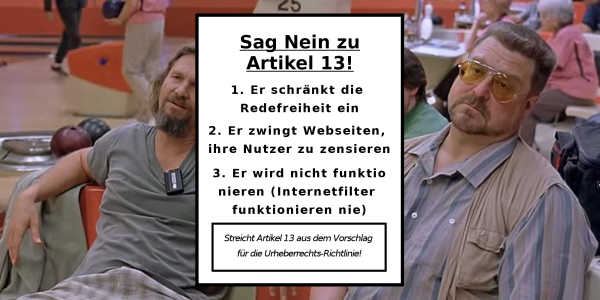
Fir d’éischt: Filter si ganz schlecht beim erkenne vun Inhalter. Et ginn e ganze Koup Beispiller dofir:
- De Schoulmeeschter säi Léiermaterial dat blockéiert gouf
- D’Biller vun der Marslandung, déi ongewollt op enger Sperrlëscht gelant sinn
- Zéngdausend vu Videoen, déi Krichsverbriechen a Syrien dokumentéieren an déi vu YouTubes Filter geläscht goufen.
Automatesch Filter, filteren ze wéineg (loosse Saachen duerch, di sollte geblockt ginn) an awer och ze vill (blockéieren Inhalter, di net geblockt solle ginn).
Et kann een net mat automatesche Filter géint Copyright-Verletzunge virgoen
Den Internet-filter gouf virgeschloen, fir Copyrightverstéiss ze verhënneren. D’Urheberrecht ass awer ze komplex fir eng eenzeg Léisung, di sech wéi d’Aaxt am Bësch ka verhalen.
Zum Beispill: Dacks ass et zoulässeg, geschütztent Material als Zitat oder als Satir ze benotzen. Heiansdo ass et dat awer och net. Meeschtens ass et esou onkloer, ob eppes erlaabt ass oder net, dass de Fall viru Gericht muss entscheet ginn. Dat si keng Entscheedungen, déi een engem automatesche Filter iwwerloosse wéilt.
Filter sinn ufälleg fir schläichend Funktiounserweiderungen
Ob laang Sicht geet et net em Copyright. Wann et no de Politiker goe géif, géife Filter dofir benotzt ginn, fir Videoen ze blockéieren oder fir ongewollte politesch Meenungen am Keim ze erstécken.
Ee Beispill dofir: Spuenien huet en Internet-filter fir illegal Glécksspillsäiten ze bekämpfen. De selwechte Filter gouf awer och benotzt, fir d’katalanescht Referendum ze verhënneren. Fir et kuerz ze maachen: Wann mir net elo handelen, dann treffen d’Politiker eng Entscheedung, di der Meenungsfräiheet massiv entgéint wierkt.
Wat kanns du maachen?
Déi kommend Wochen sinn entscheedend! Tweet oder schreif eng E-Mail un deng EU Deputéiert am JURI-Comité. De 26. a 27. Mäerz, entscheet eis Europa-Deputéiert mat iwwert den Internet-Filter. Notz d’Hashtags #CensorshipMaschine an #filterfail fir ze weisen, datt s du géint den Internet-Filter am Artikel 13 bass. Lëtzebuergesch Europa-Deputéiert am JURI-Comité ass:
- Mady DELVAUX, @mady_delvaux (LSAP / S&D).
Mir hunn well e puer Tweets virbereet (Dat soll iech net dovunner ofhalen, selwer kreativ ze ginn):
.@mady_delvaux Stitt op fir eis Meenungsfräiheet online. Schwätzt iech géint #censorshipmachine am Virschlag vun der #copyright Richtlinn aus!
.@mady_delvaux Stitt fir eis Online-Privatsphär. Schwätzt iech géint #censorshipmachine am Virschlag vun der #copyright Richtlinn aus!
.@mady_delvaux Weist, datt iech Privatsphär a Meenungsfräiheet fir d’Bierger wichteg ass. Schwätzt iech géint den Virschlag vun der #censorshipmachine an der #copyright Richtlinn aus!
.@mady_delvaux Internet-Filter funktionéieren net. Schwätzt iech géint den Virschlag vun der #censorshipmachine an der #copyright Richtlinn aus!
Politiker wëllen ongëeegent Filteren etabléiere fir den Internet kënnen ze kontrolléieren:
Deng Ënnerstëtzung ass gefuerdert!
Verstoppten EU Internet-Filter
Den gréissten Internet-Filter, deen et jee an Europa gouf, gëtt grad opgebaut. D'Europa Politiker schaffen um Gréissten Internet-Filter, dee mir jeemools gesinn hunn. Dat kléngt elo vläicht e bëssen dramatesch, ass awer leider keng Iwwerdreiwung. Falls dësen Virschlag ugeholl gëtt, mussen Firmen wéi Soundcloud, eBay, Facebook an Flickr, alles filteren, wat s du eroplueden wëlls. Een Algorithmus entscheet dann, wat s du dem Rescht vun der Welt däerfs weisen a wat net.
Firwat hunn ech dovunner bis elo nach näischt héieren?
De Virschlag fir dësen Internet-Filter ass verstoppt am Artikel 13 vun engem aneren Virschlag fir déi nei Europäesch Urheberrechtsveruednung. Mä et brauch net vill Fantasie fir sech virzestellen, firwat Internet-Filter soss nach kënnen benotzt ginn. Mir wetten, datt Politiker well drop gammsen fir Internet-Filter ze benotzen, domat se hier eegen Politesch Agenda duerchboxen kënnen. Zum Beispill: Onerwënschten politesch Meenungen verschwannen doen.
Haaptproblem
Et gëtt eng helle Wull u Grënn, keen Internet-Filter ze wëllen. Hei sinn mol déi dräi wichtegst. 1. Et ass een Ugrëff op däin Recht op eng fräi Meenungsäusserung. Du entscheets net méi selwer, wat s du deelen kanns. 2. Automatesch Filter wéi dësen, tendéieren dozou vill Feeler ze maachen an et wäert deng Aufgab ginn, géint dës Feeler fir ze goen. 3. Dëse Virschlag verleet grouss Plattformen dozou, Risiken ze vermeiden. An zwar op Käschten vun denger Fräiheet. Ergo Zensur.
Wat kanns du maachen?
Déi kommend Wochen sinn entscheedend! Tweet oder schreif eng E-Mail un deng EU Deputéiert am JURI-Comité. De 26. a 27. Mäerz, entscheet eis Europa-Deputéiert mat iwwert den Internet-Filter. Notz d'Hashtags #CensorshipMaschine an #filterfail fir ze weisen, datt s du géint den Internet-Filter am Artikel 13 bass. Lëtzebuergesch Europa-Deputéiert am JURI-Comité ass:
- Mady DELVAUX, @mady_delvaux (LSAP / S&D).
Mir hunn well e puer Tweets virbereet (Dat soll iech net dovunner ofhalen, selwer kreativ ze ginn):
.@mady_delvaux Stitt op fir eis Meenungsfräiheet online. Schwätzt iech géint #censorshipmachine am Virschlag vun der #copyright Richtlinn aus!
.@mady_delvaux Stitt fir eis Online-Privatsphär. Schwätzt iech géint #censorshipmachine am Virschlag vun der #copyright Richtlinn aus!
.@mady_delvaux Weist, datt iech Privatsphär a Meenungsfräiheet fir d'Bierger wichteg ass. Schwätzt iech géint den Virschlag vun der #censorshipmachine an der #copyright Richtlinn aus!
.@mady_delvaux Internet-Filter funktionéieren net. Schwätzt iech géint den Virschlag vun der #censorshipmachine an der #copyright Richtlinn aus!
Politiker wëllen ongëeegent Filteren etabléiere fir den Internet kënnen ze kontrolléieren:
Deng Ënnerstëtzung ass gefuerdert!
Netzneutralitéit däerf net stierwen!
Ass d’Netzneutralitéit erëm a Gefor? D’USA hunn viru kuerzem hier Netzneutralitéit opginn an domadder dem Drock vu groussen Firmen noginn. A wat kann dat fir Auswierkungen fir mech hunn? Fir d’Netzneutralitéit ganz einfach ze erklären stellt der iech vir, dir sidd op enger Autobunn. Hei däerf all Mark vun Auto drop fueren. All Auto gëtt ob eiser Datenautobunn gläich behandelt. Ouni Netzneutralitéit wär et esou, datt zum Beispill just nach Leit mat engem BMW dierfen d’Iwwerhuelspur notzen. All déi aner hätten Pech gehat.
Datt esou eppes net däerf geschéien ass hoffentlech kloer. Well een Internet ouni Netzneutralitéit féiert zu enger immenser Ongerechtegkeet. Sou muss een fir all Service extra bezuelen. Dir wëllt Netflix kucken? Dann bezuelt der extra. Dir wëllt E-Mailen schécken? Dat kascht dann extra. Dat alles féiert dozou, datt den Konsument méi muss bezuelen fir de selwechten Service deen en am Moment huet. An och Start-Ups a méi kleng Firmen ginn esou benodeelegt. Wou sech grouss Multinational Firmen eng gewëssen Prioritéit kënnen erkafen, ass dat fir anerer net méiglech. En Internet ouni Netzneutralitéit ass puert Gëft fir Weiderentwécklung vun engem Land, fir déi sozial Gerechtegkeet an natierlech fir d’Ekonomie.
Do ass et natierlech schéin ze gesinn, datt d’Europäesch Kommissioun sech well fir eng Netzneutralitéit an der EU ausgeschwat huet.
<HTML> <blockquote class="twitter-tweet" data-lang="en"><p lang="en" dir="ltr">We will continue to protect <a href="https://twitter.com/hashtag/NetNeutrality?src=hash&ref_src=twsrc%5Etfw">#NetNeutrality</a> in Europe, ensuring that all traffic is treated equally:<br>→ Every European must be able to have access to the <a href="https://twitter.com/hashtag/openinternet?src=hash&ref_src=twsrc%5Etfw">#openinternet</a> <br>→ No blocking or discrimination of online content, applications and services<a href="https://t.co/dSUM6wYwhu">https://t.co/dSUM6wYwhu</a> <a href="https://t.co/r4Tmv2oy0i">pic.twitter.com/r4Tmv2oy0i</a></p>— European Commission (@EU_Commission) <a href="https://twitter.com/EU_Commission/status/941699210679857153?ref_src=twsrc%5Etfw">December 15, 2017</a></blockquote> <script async src="https://platform.twitter.com/widgets.js" charset="utf-8"></script> </HTML>
Mat dem Accord vun dësem Evenement gëtt fir d’éischte Kéier de Prinzip vun der Netzneutralitéit an der EU beschriwwen: D’Benotzer musse gratis Zougrëff zum Inhalt vun hirer Wiel kréien. Se ginn net ongerecht blockéiert oder gedrosselt, a bezuelte Prioritéiten ginn net zougelooss.
Den Chaos Computer Club Lëtzebuerg (C3L), Frënn vun der Ënn (FVDE) a Freifunk Lëtzebuerg (FFLUX), setzen sech fir en oppenen, fräien a virun allem och onlimitéierten Zougang zu Informatiounen an!
European Governments Seek Greater Oligopolization of Telecom Infrastructures
In March, more than 31 European Community Networks (CNs) wrote an open letter to EU policy-makers, stressing the need for an adaptation of the European legal framework aimed at helping these citizen-driven initiatives flourish, thus supporting alternative, democratic and sustainable ways to meet the goals of broadband policies. But rather than opening the door to a much-needed diversification of the telecom ecosystem, European governments only seek to reinforce the dominant positions of incumbent players. As the EU gets closer to a deal over the future of European telecom regulation, the EU Parliament must resist the pressure and reaffirm its commitment to the public interest.
The European Parliament voted yesterday evening on the draft European Code for Electronic Communications, which will form the basis of telecom regulation across the EU for the next decades. The worst was avoided thanks to a majority of members of the Industry, Research and Energy (ITRE) who resisted calls for a sweeping deregulation. The version adopted by the committee maintains enough room for National Regulatory Authorities (NRAs) to regulate monopolistic situations and take Community Networks (CNs) into consideration1, for instance by giving them access to optical fiber networks or promoting shared and unlicensed access to the radio spectrum, which can be essential to swiftly build affordable and flexible networks.
The Members of EU Parliament responsible of the text – in particular the rapporteur Pilar del Castillo, known for being close to the Spanish incumbent Telefonica – will now have to negotiate with the EU Council, which represents European governments. But these so-called "trialogue negotiations" have an obvious lack of transparency, making them very difficult to follow. This is all the more worrying given that the EU Council has drafted a very alarming version of the draft code, which aims at overhauling pro-diversity policies and at encouraging the oligopolization of telecom infrastructures.
On access regulation, the Council wants to see a 7-year period without regulation after new network deployments (such as newly rolled-out optical fiber networks). The national regulatory authorities would then have no way of imposing pro-competitive obligations on incumbents, giving big telcos all latitude to extend their oligopolistic positions at the detriment of CNs and other cooperative or non-profit operators. Should the Council proposal prevail, we will witness the disappearance of small alternative network operators.
On radio spectrum, the EU Council intends to preserve the Governments' control over this vital resource, which will allow them to pursue ill-advised policies benefiting the biggest operators and failing to make the best out of the radio commons. In particular, this will undermine the alleged efforts from the European Commission to develop and extend the shared and unlicenced access spectrum, which enables the development of cooperative or non-profit operators and boosts diversity in the telecom sector.
On institutional aspects, the Council wants to let Member States decide which authority shall ensure market supervision and users' rights. By allowing for the circumvention of NRAs, this could undermine any form of independent national regulation as well as any form of coordination at European level.
In a policy domain that has for too long been prone to regulatory capture by private interests, we call on the Members of the European Parliament to defend the public interest by promoting pro-competition and pro-diversity policies. By resisting the pressure of European governments who seek to further entrench the power of the largest industry players over network infrastructures, our elected representatives can ensure that alternative operators and local communities have the adequate means to develop and innovate, offering forward-looking models and services to the benefit of all.
Co-signatories
- Aquilenet
- Association Viviers Fibre
- Chaos Computer Club Lëtzebuerg
- BlueLink Foundation
- Fédération FDN
- FDN
- freifunk.net
- Frënn vun der Ënn
- guifi.net
- Ilico
- Instituto Bem Estar Brasil
- La Quadrature du Net
- netCommons
- Ninux
- NetHood
- Open Technologies Alliance - GFOSS
- Renewable Freedom Foundation
- Sarantaporo.gr Non Profit Organization
- WirelessPT.net
WIFI4EU
EU must promote diversity in the telecom sector and resist the commodification of publicly-funded networks
Dear Sir, Madam
Delegations of Members of the EU Parliament are currently finalising trialogue negotiations on the WIFI4EU draft regulation. The regulation will allow local authorities to open WiFI hotspots to boost Internet access, particularly in underserved communities.
WIFI4EU is an initiative announced last year by President Juncker in his "State of the Union" speech in Strasbourg. To deliver on this promise "to equip every European village and every city with free wireless Internet access around the main centres of public life by 2020", the EU will unleash 120 million between by 2017-2019 to roll out WiFi hotspots in at least 6,000 to 8,000 local communities.
But as the trialogue draw to a close, there is a huge risk of seeing this laudable initiative miss the opportunity of fostering diversity in the telecom sector as well as human rights. Recent negotiations show that Member State governments seek to keep small and local access providers out of the scheme, favouring incumbent multinational corporations while allowing them to spy on users' communications.
To overcome these risks, we call on the EU Council and the EU Commission to endorse the constructive proposals put forward by the European Parliament, and ask that the letter stand firm to safeguard the public interest in EU telecom policies.
Making room for SMEs and non-profit entities
In recital 4 of the regulation, the European Parliament insists on the involvement of organisations such as "not-for-profit cooperatives" and "community centres" as entities that could offer wireless connectivity. In the same vein, at recital 9b, the EP wants to promote local SMEs and not-for profit actors as key beneficiary for the procurement and installation of equipment 1. Such language ensures that small, local actors — including for-profit SMEs as well as many non-profit community networks — will be eligible to WIFI4EU funds. By directing the funds to these small but competent players, WIFI4EU would promote local employment, spread of technical skills as well as diversity in the telecom sector, rather than favouring already dominant players in the industry. This is all the more shocking considering that many non-profit community networks are already rolling out the kind open wireless networks promoted by WIFI4EU, with little or no public support. By directing EU funds to these actors when possible, WIFI4EU has the potential of helping them grow and expand their activities at the local level. Unfortunately, the EU Council is trying to remove these recitals arguing that they lack any legal basis, and paving the way for dominant actors to reap most of WIFI4EU subsidies.
Recital 4
Protecting the right to privacy by renouncing to prior authentication
In recital 2, both the EU Parliament and EU Council are promoting a solution for a single authentication system that can be used across the EU. This solution favouring authentication system to regulate access to "open" networks is not backed by any substantial reasoning, and runs counter to human rights. We understand the co-legislators' goal of making access to these public networks as easy as possible for people travelling across the EU, but the most simple way to do so is to ensure these are, indeed, open networks without authentication. If the goal of having an authentication system is to prevent illegal activities, co-legislators should be reminded that Advocate General of the CJEU recently explained in the case C‑484/14 (McFadden) that imposing on Wi-Fi network operators an obligation “to identify users and to retain their data” would be “clearly disproportionate” as it “would not in itself be effective (…) in preventing specific infringements”. In the final ruling, the Court agreed that such an obligation should only be imposed after a specific targetting injunction requiring a WiFi operator to do so. To minimise privacy risks associated with data retention and foster ease of use, WIFI4EU should not promote authentication systems in what are meant to be open and free access points.
Recital 2
Keeping advertising and commercial surveillance out of public wireless networks
WIFI4EU should not commodify publicly-funded services by allowing advertising schemes enabled by commercial surveillance. Unfortunately, the Council is trying to undermine the protection suggested by the EP in recital 2, which precludes the use of traffic data for advertisement purposes or other commercial uses. The EP and Council must keep the EP version to be fully in line with the data protection framework and the EU Charter of Fundamental Rights. Furthermore, commercial use of data cannot be justified within an implementation of public utilities —especially when funded through public money.
Offering free, open and neutral access to those who need it the most
The number one priority for WIFI4EU must be to develop open and free wireless networks that boost Internet access in underserved communities. The Council's proposal to delete the policy objective of "preventing remote locations and rural areas from lagging behind" and of making these publicly-funded networks both "free of charge and free from restrictions" is dangerous. It suggests that WIFI4EU networks might not be free, nor open, nor even respect the Net neutrality principle enshrined in the EU regulation on the telecom single market. The language put forth by the EU Parliament must be upheld.
Recital 4a
Recital 2§2c
We count on you to ensure that the proposals of the EU Parliament, which serves the general interest and specific goals of EU broadband policy, are safeguarded in the final text.
Read the full document here (pdf)
Signatories
- Aquilenet (France)
- BlueLink Civic Action Network (Bulgaria)
- CAFAI (France)
- Colectivo Helianto (Navarra)
- Common Grounds (Germany)
- Chaos Computer Club Lëtzebuerg (Luxembourg)
- exo.cat (Spain)
- FDN (France)
- FFDN (France)
- Free Knowledge Institute (Europe)
- Frënn vun der Ënn (Luxembourg)
- Funkfeuer Wien (Austria)
- Guifi Foundation (Spain)
- IGWAN.NET (France)
- Ilico (France)
- La Quadrature du Net (France)
- LibreMesh (Global)
- wlan slovenija, open wireless network (Slovenia)
- netCommons (EU)
- NetHood (Switzerland)
- Open Technologies Alliance - GFOSS (Greece)
- Progetto Neco (Italy)
- Sarantaporo.gr Non Profit Organization (Greece)
- SCANI (France)
- Tetaneutral.net (France)
- Viviers Fibre (France)
- Wireless België (Belgium)
- Xnet (Spain)
- WirelessPT.net (Portugal)
OPEN LETTER TO EU POLICY-MAKERS
Policy recommendations for sustaining community networks
We represent European Community Networks, a growing movement of organizations that operate local communication infrastructures, sometimes federated at the regional or national levels. These networks, most of which also provide access to the global Internet, are operated as a commons. That is, rather than being driven by for-profit motives, our key focus is on providing connectivity while striving for democratic governance, social inclusion, education, and human rights with respect to communication technologies.
Our organizations vary considerably in terms of sizes, types of network infrastructures and political cultures. Yet, despite this diversity, we are united by the common objective to build networks that meet the communication needs of humans (rather than those of objects and machines), through networks that are built and run by our communities, for our communities, focused on local empowerment, affordability and resiliency.
Today, we collectively provide broadband connectivity not only to tens of thousands of individual European citizens and residents in rural or urban settings, but also to organizations including small and medium sized companies, schools, healthcare centers, social projects and many more. In many cases, we have out-competed mainstream operators, by providing cheaper and faster Internet connectivity than incumbent players. Thanks to our infrastructures and through our various activities, we foster scientific and engineering experiments, we help local hosting and service providers come together to mutualise investments and share costs, we support digital literacy and data sovereignty through workshops and other educational activities.
Yet, despite our achievements, policy-makers at the national and European levels have so far mostly neglected our existence and specific regulatory needs. Worse, regulation is often hampering our initiatives, making the work of our participants and volunteers harder than it should be. This is why, as you start working on a European code of electronic communications, we decided to contact you and voice our ideas and recommendations regarding the future of the legal and policy framework regulating our activities.
1. Lifting unnecessary regulatory and financial burdens
We first ask you to review the regulatory framework and get rid of unnecessary regulatory burdens, such as fees or red-tape that are unnecessary or illegitimate when imposed on small non-profit entities. In Belgium for instance, the registration fee that telecom operators must pay to the NRA is at 676€ for the first registration, plus 557€ every following year (for those whose revenues are below 1M€, which is the case for many community networks). Even such small fees can hinder the growth of small networks that efficiently serve tens of households. In France, Spain and Germany, it is free, which might explain why the community network movement is much more dynamic in these countries. The proposed code for electronic communications aims to harmonize procedures for declaration fees (first registration) as well as administrative charges (annual fees). EU lawmakers must ensure that the fees and charges imposed by national NRAs are null or negligible for non-profit ISPs and reasonable and proportionate for micro and small businesses. Likewise, taxes designed for large corporate firms in the telecom sectors should not apply to smaller, non-profit operators.
2. Getting rid of third-party liability when sharing Internet access
Several laws seek to prevent the sharing of Internet connections amongst several users by making people responsible (and potentially liable) for all communication made through their Wi-Fi connection, and create legal risks for people sharing their connection. In Germany, rights-holders have used a "secondary liability" doctrine to chill the growth of the community networks movement. In France too, copyright law imposes a secondary liability regime that creates significant legal uncertainty for people sharing their network connections with other users. The so-called "mere conduit", inscribed in EU law since 2000 in the directive on information society services, needs to be guaranteed and expanded to small-area wireless access points. In the same spirit, contract clauses that forbid subscribers to share their connections with others should be prohibited. Promoting a right to share Internet connections is all the more vital considering the economic and ecological crises, as well as the rapid increase of populations that cannot afford access to the Internet. In this context, connection sharing can play a critical role in fostering a more equitable and sustainable use of telecommunications infrastructure.
3. Expanding the spectrum commons
It is not just Internet wireless access points that can be shared, but also the intangible infrastructure on which radio signals travel. Wi-Fi, as an unlicensed portion of the spectrum and therefore a commons, is a key asset for community networks willing to set up affordable and flexible last-mile infrastructure. However, these Wi-Fi frequency bands are currently very limited. Not only are they getting increasingly subject to congestion in densely populated areas, they are also exposed to new technical standards that use the so-called ISM frequency band (like LTE-U) that hamper the reliability of Wi-Fi communications. Last but not least, existing frequency bands for Wi-Fi (5,6 Ghz and 2,4 Ghz) have physical constraints that prevent them for being used for longer radio links. In the face of such challenges, a new approach to spectrum policy is needed. Policy-makers should expand unlicensed Wi-Fi bands. Other types of frequencies should also be made available either on an unlicensed (preferred scenario) or, if not possible, based on affordable and flexible authorization schemes. Such frequency bands for instance include so-called white spaces in lower frequencies (which allow for cheap and resilient long-distance links), as well as the 12Ghz and the 60Ghz bands (for which radio equipment is affordable and which can help us build high-bandwidth point-to-point radio links). Once made accessible to community networks, they can help roll-out and expand cheap and resilient wireless infrastructures.
4. Updating open-access rules in telecom infrastructures
Networks built with taxpayers money should also be treated as a commons and, as such, remain free from corporate capture. Today, their management and exploitation is often delegated by public authorities to corporate network operators. These entities usually adopt aggressive pricing schemes designed for incumbent players that make it extremely costly for small access providers to interconnect with these networks. Access to these publicly-funded networks for non-profit entities like community networks as well as small businesses should be guaranteed, at a reasonable and proportionate cost. Similarly, community networks often cannot have access to the private local infrastructures of incumbent players, despite the fact that these are the only way to connect willing subscribers. Indeed, in many European markets, the deployment of optical fiber networks is (re)creating monopolistic conditions on local loops through pricing schemes which preclude small actors from accessing these private networks. Policy-makers and regulators should ensure that every area is covered by at least one telecom operator with a so-called "bitstream" offer affordable for smaller players.
5. Protecting free software and user freedom in radio equipment
In 2014, the European Union adopted Directive 2014/53 on radio equipment. Although the Directive pursues sound policy goals, it might actually impair the development of community networks. Indeed, community networks usually need to replace the software included by the manufacturer in radio hardware with free and open source software especially designed to suit their needs, a collective process that improves security and encourages the recycling of hardware, among other benefits. Article 3.3(i) of the said Directive creates legal pressure for manufacturers of radio devices to ensure the compliance of the software loaded on these devices with the European regulatory framework. As a result, there is a strong incentive for manufacturers to lock down their devices and prevent third-party modifications of the hardware. We therefore ask policy-makers to provide a general exception for all free software installed on radio devices by end-users and operators (the latter being liable if their software lead to violations of the regulatory framework), so that users' rights are safeguarded.
6. Abrogating blanket data retention obligations
Community networks strive to safeguard human rights in communication networks, and in particular the right to privacy and the confidentiality of communication. While we welcome recent rulings by the Court of Justice of the European Union holding that indiscriminate retention of metadata violates the Charter of Fundamental Rights, we are concerned about several member states' willingness to circumvent these rulings to protect capabilities for indiscriminate surveillance. As EU lawmakers start discussing the overhaul of the ePrivacy Directive, we call on them to oppose any blanket data retention obligations and close existing loopholes in EU law to ensure that only targeted and limited retention obligations can be imposed on hosting and access providers.
7. Bringing direct and targeted public support
Countless other policy initiatives can help support community networks and the significant associated benefits they bring. Such policies include small grants, crowd-funding and subsidies to help our groups buy servers and radio equipment, communicate around their initiative, giving them access to public infrastructures (for instance, the roof of a public building to install an antenna), but also to support their research on radio transmission, routing methods, software or encryption. As many local authorities have found, supporting community networks is a sound policy option. As EU lawmakers move forward on the WiFi4EU initiative, we would like to remind you that we have pioneered various models for the provision of free public access points. We believe that public money invested in this initiative should primarily go to groups pursuing a bottom-up logic, seeding local groups that can foster the empowerment and cohesion of local communities, nurture competition, and meet the same policy-objectives at a fraction of the cost that would be charged by mainstream telecom operators.
8. Opening the policy-making process to Community Networks
Although we have often partnered with municipalities and local public authorities, we ask that national and European regulators pay more attention to our activities when drafting regulation. Community networks have both the expertise and legitimacy to take an integral part in technical and legal debates over broadband policy in which traditional, commercial ISPs are over-represented. Community networks can bring an informed view to these debates, allowing for a policy-making process more attuned to the public interest.
We thank you for your attention and very much look forward to engaging with you on these important issues,
First signatories (EU-based community networks)
- 020wireless (Netherlands)
- AIL-Network (France)
- Alsace Réseau Neutre (France)
- Aquilenet (France)
- Association Ribaguifi - Eresué 2.0 (Spain)
- Asoc. SevillaGuifi (Spain)
- Common Net (Italy)
- FAImaison (France)
- FDN (France)
- FFDN (France)
- Franciliens.net (France)
- Freifunk.net (Germany)
- Fundació guifi.net (Spain)
- Funkfeuer (Austria)
- Grenode (France)
- Grifon (France)
- Ilico (France)
- Illyse (France)
- Iloth (France)
- Neutrinet (Belgium)
- Ninux.org (Italy)
- Open Network in Croatia (Croatia)
- Progetto Neco (Italy)
- Progetto Wireco Ciminna (Italy)
- Rézine (France)
- Sarantaporo.gr NPO (Greece)
- SCANI (France)
- Tetaneutral.net (France)
- Tourraine Data Network (France)
- Wireless België (Belgium)
- Wireless Leiden (Netherlands)
- WirelessPT.net (Portugal)
- Wlan slovenija (Slovenia)
Supporting organizations (signing in support of the general approach and/or specific proposals put forward in the letter)
- ApTI (Romania)
- ARTICLE 19 (UK)
- Bits of Freedom (Netherlands)
- BlueLink.net - Civic Action Network (Bulgaria)
- Brazilian Association of Digital Radio (Brazil)
- Chaos Computer Club (Germany)
- Chaos Computer Club Lëtzebuerg (Luxembourg)
- Colnodo (Colombia)
- Common Ground (Germany)
- Commons Network (EU)
- EDRi (EU)
- EFF (US)
- epicenter.works (Austria)
- Free Knowledge Institute (Netherlands)
- Free Software Foundation Europe (EU)
- Frënn vun der Ënn (Luxembourg)
- GreenNet (UK)
- hackAIR (EU)
- Initiative für Netzfreiheit (Austria)
- Instituto Bem Estar Brasi (Brazil)
- Instituto Nupef (Brazil)
- La Quadrature du Net (France)
- netCommons (EU)
- netHood (Switzerland)
- Network Bogotá (Colombia)
- NEXTLEAP (EU)
- NURPA (Belgium)
- Nuvem (Brazil)
- One World Platform (Bosnia Herzegovina)
- Open Rights Group (UK)
- Open Technologies Alliance- GFOSS (Greece)
- P2P Foundation (Netherlands)
- P2P Lab (Greece)
- PIE News Project (EU)
- Project Arig (Israel)
- Rhizomatica (Mexico)
- Renewable Freedom Foundation (Germany)
- VECAM (France)
- Xnet (Spain)
- Zenzeleni Networks (South Africa)
Chaosstuff Inauguration
Remember remember the 5th of November… yeah you totally should because November the 5th was the official inauguration of our Hackerspace "Chaosstuff"! A precious date for a precious event so to say.
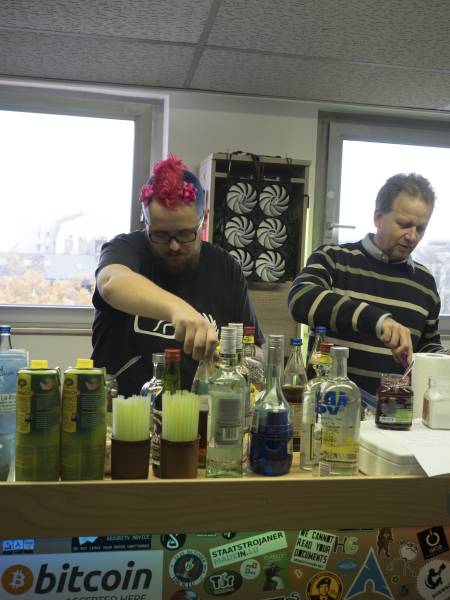
Our fellow Hackers actually cleaned up the two rooms, held a soldering workshop, mixed cocktails for all and made sure you won't leave hungry!
We had enough visitors to DDoS the rooms capacities. I guess that was because our Hackerspace houses more than one NGO. The Chaos Computer Club Lëtzebuerg wanted to create a Hackerspace where more NGOs could gather. Currently we also house the Frënn vun der Ënn and the Repaircafé Luxembourg. More clubs = more traffic at the Inauguration. Still everything went fine and we all had a good time.
We would like to thank YOU for coming by. We hope that you found a new cool place to work on your projects and a community to share your knowledge with. More impressions of the day can be found here!
35th Anniversary
Today, 35 years ago, the Chaos Computer Club was founded in Berlin. Back in these days, Hackers were still a sub-culture which were looked very negatively upon and were feared by people through all society.
Nowadays Hackers and the formed culture around them are irreplaceable for their expertise in IT-Security, data privacy, digital foresight and many other topics in these domains.
I guess, a good way to get to know the way of Hackers or CCC is either to tag along for an event of ours, or watch this short report on the CCC in Germany an its history.
Nonetheless, never forget to Hack on!
